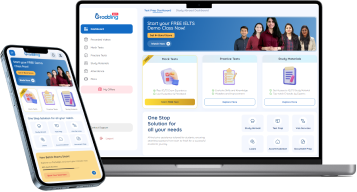The IELTS test has become a global synonym for English proficiency if you want to study, migrate or work in English-speaking countries like the UK, USA, Australia, Canada and more. Thus, in this blog, we will dive into the benefits of the IELTS test in 2025 and the structure of the IELTS test and uncover myths attached to IELTS to equip you with the knowledge and confidence you need to succeed. So let's begin with the IELTS benefits.

Table of Contents
Whether you're dreaming of studying abroad, advancing your career, or starting a new life in another country, the benefits of taking the IELTS test are boundless and can transform your future in remarkable ways.
Many universities worldwide recognize IELTS scores, making them essential for admission. Achieving a good score opens doors to top-notch academic programs and scholarships worldwide.
In today's globalized job market, strong English skills are highly valued by employers. With an IELTS certification, you become more attractive to employers across various industries, paving the way for career advancement.
Planning to move to an English-speaking country? IELTS scores are often a mandatory requirement for visa and immigration applications. A good score can expedite the process and improve your chances of success.
The Speaking test assesses your ability to communicate effectively in everyday situations.
Have you ever wondered why IELTS is so popular when there are also other English language proficiency tests? If yes, here are a few top features of IELTS test that makes it everyone's first choice:
The IELTS test evaluates your English skills in listening, reading, writing, and speaking. This holistic assessment gives you a clear picture of your strengths and areas for improvement.
The IELTS test is a trusted measure of English language skills for many international students who are aspiring to study in English-speaking countries. It is known for:
There are many IELTS benefits why make it the most preferred proficiency exam. One such is its flexibility in preparation which includes online and offline mode. More information about this exam study and preparation includes:
IELTS test offers three test formats to choose from, depending on your objectives. You can choose any one of these as per your requirements:
If you are planning to appear for this test, then you have complete freedom to pick a date or time of your choice along with the type of test mode. You can learn more about them here:
The IELTS test provides a single-skill retake option, allowing test-takers to retake only one section of the exam if needed. To be eligible for this option, candidates must have taken the full IELTS test within the past two years.
Now, that you know the benefits of taking this exam, are you planning to give it a try? If yes, then you should first check if you’re eligible for taking this.

Anyone can take the IELTS test. IDP, the conducting body of the IELTS test, has specified about IELTS exam eligibility that there are no educational qualifications required to take the test. Whether you're aiming for higher education abroad, seeking employment opportunities, or planning to migrate, you can attempt the IELTS exam (both Academic and General Training). The only criterion is a minimum age of 16 years to apply. However, there is a specific IELTS exam pattern followed by IDP.
IELTS (International English Language Testing System) is not just an exam, it is your passport to top universities and more than 10,000 organizations in the world. it's a measure of your ability to master the four pillars of English communication: listening, reading, speaking, and writing. Like other exams, IELTS also follows a dedicated structure, IELTS exam pattern, and IELTS syllabus that every aspirant must master.
| Type of Test | Test Pattern | No. of Questions | Time Given |
|---|---|---|---|
| Reading | Multiple Choice Diagram Completion Sentence Completion Summary Completion | 40 Question | 60 minutes |
| Listening | Matching Features Matching Headings Multiple Choice Sentence Completion Summary Completion | 40 Question | 30 minutes |
| Speaking | Three Tasks | 3 | 11-14 minutes |
| Writing | Two Tasks | 2 | 60 minutes |
The Reading, Listening, and Writing IELTS Test will be conducted on the same day without a break but the Speaking Test will be conducted within seven days of test depending upon the arrangement and type of test.
The IELTS exam consists of four main sections: Listening, Reading, Writing, and Speaking. Here's a brief overview of the structure of each section:
You'll listen to four recordings of native English speakers and answer a series of questions. The recordings include conversations, monologues, and academic discussions. You'll have time to read the questions and write your answers as you listen.
The Reading section consists of three passages of increasing difficulty, each followed by a set of questions. The passages are taken from books, journals, magazines, and newspapers. You'll need to read the passages carefully and answer questions on topics such as main ideas, supporting details, and vocabulary.
In the Writing section, you'll be required to complete two tasks:
The Speaking section is a face-to-face interview with a certified examiner. It's divided into three parts:
Overall, the IELTS exam assesses your English language proficiency across a range of skills, including listening, reading, writing, and speaking, in a variety of contexts relevant to academic and real-life situations. Deciding to take the IELTS test isn't just about passing or taking a test it's about seizing life-changing opportunities.
On the other hand, even though the benefits of the IELTS exam are numerous, like better job chances and being known worldwide, it's important to clear up any misconceptions that might stop people from taking it.
Here are a few popular myths about the IELTS test in India, along with the realities behind them to help you differentiate between what is true and untrue:
1. Myth: You need a British or American accent to score well on the Speaking test.
2. Myth: It's impossible to achieve a high score on the writing test without prior knowledge of complex vocabulary and grammar structures.
3. Myth: The difficulty level of the IELTS test varies based on test location or examiner leniency.
4. Myth: The IELTS test is a one-time affair
5. Myth: If you fail to achieve your desired score on your first attempt, you'll never succeed in subsequent attempts.
By discarding these myths and understanding the realities and IELTS exam uses you can approach the preparation with confidence and clarity, focusing on effective strategies and targeted improvement areas.
So, whether you're pursuing education, career growth, or a new adventure abroad, IELTS certification can make it happen. Now that you know the benefits of IELTS test why wait? Start your IELTS journey today and unlock a world of possibilities with Gradding.com.
Gradding.com can help you with IELTS exam uses, how to take the IELTS test, and how to choose the best module, type, location, time, study material, and more. Experts at Gradding.com are here to make things simpler for you when studying abroad.

We are available in :
BangaloreAhmedabadJaipurHyderabadKeralaPuneChandigarhMumbaiGurgaonChennaiKolkataTrivandrumNoidaKochiCalicutKottayamKollamThrissurIndoreUdaipurdisclaimer:logos and other registered trademarks of universities used on this platform are held by their respective owners. Gradding does not claim ownership or association on them, and their use is purely for informational and illustrative purposes.


